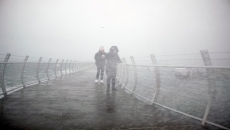WILLIAMS LAKE, B.C. — A British Columbia aboriginal nation granted rights and title by Canada's high court has introduced its own laws governing its territory and resources within the area.
The Tsilhqot'in National Government has enacted the so-called Nemiah Declaration that prevents mining and commercial logging, stops commercial road building and requires visitors to get permission before entering the land.
The Tsilhqot'in Nation, located west of Williams Lake in the B.C. Interior, was granted 1,750 square kilometres of land in a Supreme Court of Canada decision last June.
The nation first created the declaration in 1989 in response to the threat of widespread clearcut logging, prompting years of negotiations that culminated in the high court's ruling.
In a news release issued Friday, tribal chairman Chief Joe Alphonse said the law comes straight from the nation's people and elders.
"There will be many more laws and policies to come as we strive as a nation to express our values, our culture and our vision for the future on our declared aboriginal title lands and throughout our territory."
The declaration states that the area is the spiritual and economic homeland of the people and they will continue to carry out traditional rights of hunting, fishing, trapping and the tradition of native medicine, religion and sacred and spiritual ways.
"We are prepared to enforce and defend our aboriginal rights in any way we are able," the document says.
Tsilhqot'in government vice-chairman Roger William said the nation is proud of its first law on title land and the goal has always been to enact such rules in current times.
"With this comes challenges, but setting the stage for governance, for good governance, is one of our first priorities," William said in a statement.




